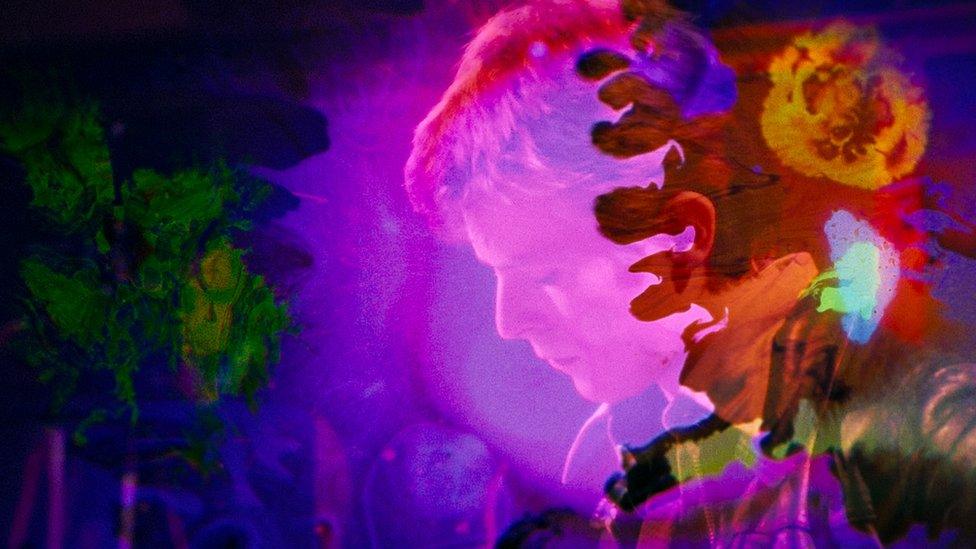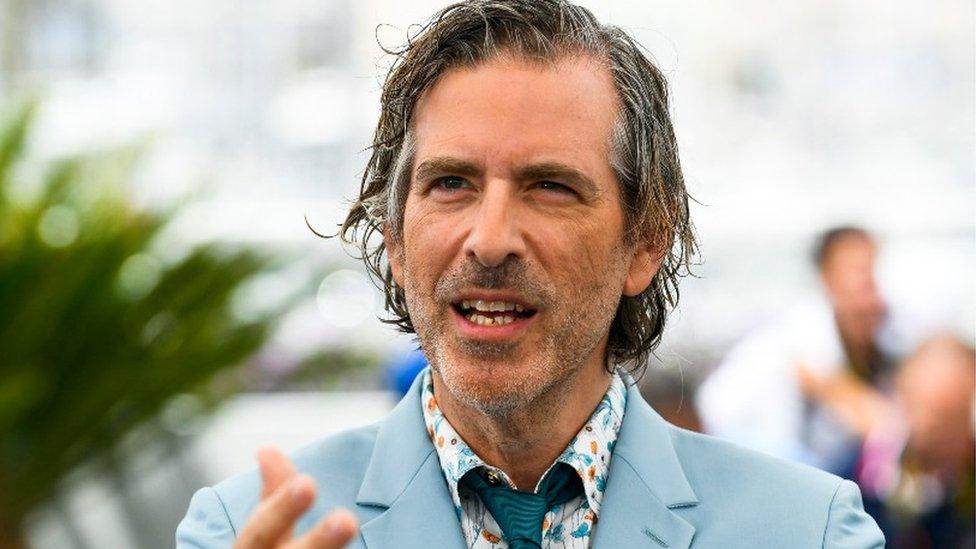Moonage Daydream: David Bowie taught me how to live again, says film-maker
- Published

Moonage Daydream takes its title from a track on David Bowie's album The Rise and Fall of Ziggy Stardust and the Spiders from Mars
The director of an acclaimed new documentary dedicated to the words and music of David Bowie credits the singer with "teaching him how to live" after he suffered a heart attack in his late forties.
Brett Morgen, the director of Moonage Daydream - a 140-minute film without narration, but filled with Bowie's interviews, musings on art and his performances - says his own life was "out of control" when he began work on the film in January 2017, almost exactly a year after the British musician died.
"One of the greatest legacies anyone can have is to continue to inspire when we're no longer here, and David does exactly that," Morgen tells the BBC.
"David Bowie changed my life. I first came to him as I became a teenager, and his impact was tremendous. Then, just as I started working on this film, I suffered a massive heart attack. I flatlined for three minutes and was in a coma.
"My life was out of control, and I was entirely work obsessed. I put all my ego into my work and I'm the father of three kids. When you have an experience like that, you think, what's been the message of my life? Work hard and die in your 40s..."
He adds: "I needed to learn how to live again and that's when David Bowie really came back into my life at the age of 47.
"He transitioned me from childhood, and then he transitioned me from being a man-child to being a proper father. That to me was his greatest gift. I had no idea going into this how he would impact my life."
Allow YouTube content?
This article contains content provided by Google YouTube. We ask for your permission before anything is loaded, as they may be using cookies and other technologies. You may want to read Google’s cookie policy, external and privacy policy, external before accepting. To view this content choose ‘accept and continue’.
Morgen, who also made the 2015 film Cobain: Montage of Heck, about the life and death of Nirvana's Kurt Cobain, premiered the new film this week at the Cannes Film Festival - and danced on the red carpet to Bowie's music.
Moonage Daydream, the first documentary authorised by David Bowie's estate, features never-before-seen footage of Bowie, including concert footage from Earl's Court, London, in 1978, where excited fans can be seen running into the arena, followed by Bowie performing Heroes on stage.
"We were the first people to be able to access that material and that was a true revelation," Morgen says, adding that he looked through almost five million Bowie "assets" over the five years of making the film.
"My personal favourite moment in the process was finding material of the 1975 Soul tour [which] I didn't know was in existence," he adds. "But I want the film to be more than the sum of its parts of footage."

Brett Morgen directed the new film, which premiered at the Cannes Film Festival on Monday
The documentary also focuses on the singer's artistic interests in sculpture, theatre, film and painting, and his travels in East Asia, as well living in Berlin in the then East Germany in the 1970s, saying he wanted to make himself "uncomfortable".
"He just wanted to make the most out of every day, and recognised that feeling comfortable is a falsehood," Morgen explains. "If it's easy, why do it? So once Bowie mastered something, he moved on."
Bowie's marriage to Somali supermodel and actress Iman in the early 1990s was another pivotal point. The couple were married for nearly 25 years until his death.
"Something changed when he met Iman," Morgen says. "That's why the film doesn't keep going for ever after a certain point. He was at a plateau, but he was still able to do some work, some of his most beautiful work, I think.
"In 1995, when he made Outside, people thought he was getting hip to the younger kids in his forties, and he was dismissed by some.
"But he was doing the same thing he had always done, which was appropriating sounds and culture and making them his own."
First reviews of the film include entertainment website IndieWire, external describing it as "a fitting encapsulation of the many 'he taught me it was OK to be weird' sentiments in the wake of Bowie's death".
In a five-star review, The Guardian, external's Peter Bradshaw said it's a "shapeshifting, epiphany-slash-freakout leading to the revelation that, yes, we're lovers of David Bowie and that is that".
However, The Hollywood Reporter, external said "anyone encountering him for the first time in Morgen's film might be forgiven for concluding that alongside the musical genius, he could be a pretentious bore".
Morgen says that, during his career, "this is the first film where I haven't felt a need to read reviews or comments about it".
"Regardless of whether anyone likes the film, I got so much from David, it was such a personal experience for me," he explains. "I'm blessed that I could spend that time with his image and his voice."
Related topics
- Published8 May 2022

- Published3 January 2022
